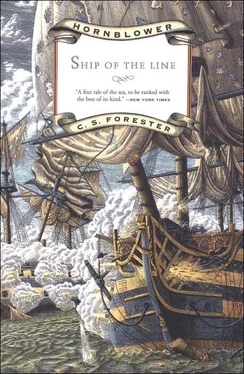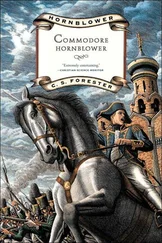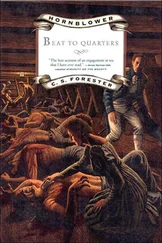“Aye aye, sir.”
It was quite fantastic to see what seamen could turn their hands to. They fell to work with a will, knotting and tying. The English words they used may have sounded strange to the Spanish horses’ ears as they wheeled the animals into position, but they seemed to be effective enough. Even the horse-holders, gabbling Catalan, pushed and shoved until they were more help than hindrance. Whinnying and clattering in the darkness—barely relieved by the light of a dozen lanterns—the puzzled brutes were got into line. Rope collars padded with canvas were slipped over their heads, rope traces were passed back to the eyebolts in the gun carriage.
“Avast!” roared one of the sailors just as the strain was beginning to come on. “This beggar’s got his starboard leg over the line.”
By the time the second gun had reached the water’s edge they were ready to start hauling up the first. Whips cracked and sailors shouted. The horses plunged as they sought foothold in the sand, but the gun began to move, with a vast creaking and cracking of timber under the trucks. The movement was spasmodic and jerky, and when they began to breast the steep slope of the combe it died away altogether. Twenty Spanish horses, underfed and undersized, could not haul that gun up the slope.
“Mr. Moore,” said Hornblower, irritably. “See that that gun is hauled up.”
“Aye aye, sir.”
A hundred men on dragropes as well as twenty horses managed it, aided by a party behind with crowbars to help over the worst inequalities and to sprag the wheels with rocks at moments when neither men nor horses could pull for another second. Hornblower felt he had really accomplished a great deal when he stood on the summit, with dawn creeping out of the sea, and looked at the line of ten guns, and the mountain of stores, which had been all dragged up in the course of the night.
The gradual coming of the light enabled him to look about him. Down below was the golden beach, dotted with details of the landing party, and beyond that the blue sea, with the ships of the squadron rolling to their anchors. On his own level the summit of the peninsula stretched in a rocky, uneven expanse before him. Over to his right the rock broke completely through in a vast table-topped hill, but southward, in the direction of Rosas which he would have to follow, a narrow goat path wound through the low scrub of arbutus bushes. Claros beside him was revealed as a lean man, sunburnt to the colour of tobacco, with a long black moustache above an excellent set of white teeth, which he displayed in a smile.
“I have a horse for you, Captain.”
“Thank you, Colonel. That is very kind of you.”
There were a few brown figures creeping dispiritedly about the rocks; in the dips between the low crests there were brown masses which were just beginning to disintegrate in the sunlight from huddles of sleeping men into sleepy groups, who, still clutching their blankets about them, moved aimlessly here and there. Hornblower regarded his allies with a disfavour which was not diminished by the fact that it was exactly what he had anticipated, and which was intensified by his sleepless night.
“Would you be so kind,” he said, “as to send a message to Colonel Rovira, telling him that we are about to march on Rosas, and that I hope to reach there with at least some of the guns at noon?”
“Certainly, Captain.”
“And I must ask you for the help of your men in the transport of my guns and stores.”
Claros looked more dubious at that, and more dubious still when he was told that of his men four hundred would be needed to help with the guns while another four hundred would have to carry a twenty-four pound cannon ball each all the way to Rosas. Hornblower overrode his objections a little crossly.
“And after that, Colonel,” he said, “they will have to return here for more. I was promised a sufficiency of pack animals; if you do not supply me with four-legged ones, I must use those with two. Now, if you please, I want to get the column started.”
Ten horses or mules to every gun, with a hundred men at the drag-ropes. A hundred men ahead to labour on the task of improving the path, rolling rocks out of the way and filling up holes. Four hundred men carrying cannonballs, some of them leading the packmules with gunpowder kegs slung over their backs. Claros looked still more askance when it became apparent that every man of his tercio would be at work, while Hornblower proposed to leave two hundred of his marines free of any labouring duty.
“That is how I wish it arranged, Colonel. If you do not like it, you can try to find a Spanish battering train.”
Hornblower was determined upon keeping a substantial portion of his disciplined force closed up and ready for an emergency, and his determination was obvious enough to silence Claros’ protests.
There was already an outcry behind them where the mules were being loaded up. Hornblower strode over with Claros at his heels, to find a Spanish officer threatening Gray with a drawn sword, his ragged guerilleros behind him handling their muskets.
“What’s all this? What is happening here?” demanded Hornblower, first in English and then in Spanish. Everybody turned to him all speaking at once, like schoolboys in a playground dispute. The officer’s explosive Catalan was almost incomprehensible to him, and he turned to listen to Gray.
“It’s like this, sir,” said the master’s mate, displaying a lighted cigar in his hand. “This Dago lieutenant here, sir, he was a-smoking this while we was loading up the mules. I says to him, very respectful, sir, ‘No smoking in the magazine, sir,’ but he didn’t take no notice, not understanding, maybe. So I says to him, I says, ‘No smokingo, magazine, señor,’ an’ he just blew out a puff of smoke and turned his back on me. So I took away his cigar, an’ he drew his sword, sir.”
Claros had at the same time heard his officer’s explanation, and Claros and Hornblower faced each other.
“Your sailor has insulted my officer,” said Claros.
“Your officer has been very foolish,” said HornbJower.
It seemed like an impasse.
“Look, sir,” said Gray, suddenly. He pointed to one of the barrels swinging against the ribs of the patient mule who bore it. It was slightly stove, and a thin black trickle of powder had run from it. There was powder on the mule’s flank, powder on the ground. The danger of fire was obvious, must be obvious even to a Catalan. Claros could not suppress a half smile as he looked.
“My sailor acted hastily,” said Hornblower, “but I think you will admit, Colonel, that he was in part justified. He will tender a profound apology, and then, perhaps, you will issue strict orders against smoking near the powder.”
“Very well,” said Claros.
Hornblower turned to Gray.
“Say to the officer ‘God save our gracious king, señor.’ Say it humbly.”
Gray looked startled.
“Go on, man,” said Hornblower testily. “Do what I say.”
“God save our gracious king, señor,” said Gray, in a tone that was at least unnatural, if not humble.
’The man wishes to express to you his profound regret for his rudeness,” explained Hornblower to the officer, and Claros nodded approvingly, spat out a couple of brief orders, and turned away. The crisis was over, and no feelings hurt on either side. The sailors were grinning and cheerful, while the Catalans looked proudly down upon the lighthearted barbarians.
Captain Hornblower checked his horse on the top of the last of the hitherto interminable rocky undulations. The August sun was blazing overhead, and innumerable flies plagued him and his horse and his companions. At his side rode Claros, behind them Longley and Brown sat uneasily their rawboned Rosinantes along with the three Spanish staff officers. Far back along the path was a solid block of scarlet. Major Laird had his marines formed up as an advance guard, while here and there on the grey-green hills scarlet dots showed where he had posted pickets as a precaution against surprise. Farther back still could be seen a caterpillar of men, naked to the waist, labouring at their task of improving the path for the guns, and beyond that a sort of multiple caterpillar with a black dot at the end showed where the first gun had reached. In five hours it had travelled little more than three miles. Hornblower, looking up at the sun, saw that he had an hour and a half left in which to keep his appointment—in which to haul his guns over a mile of rock and over a mile of the plain which lay below him. He felt a twinge of conscience at the thought that he would probably be a little late with the first of the guns, and he certainly would not be able to open fire against the walls before five or six o’clock in the evening.
Читать дальше









